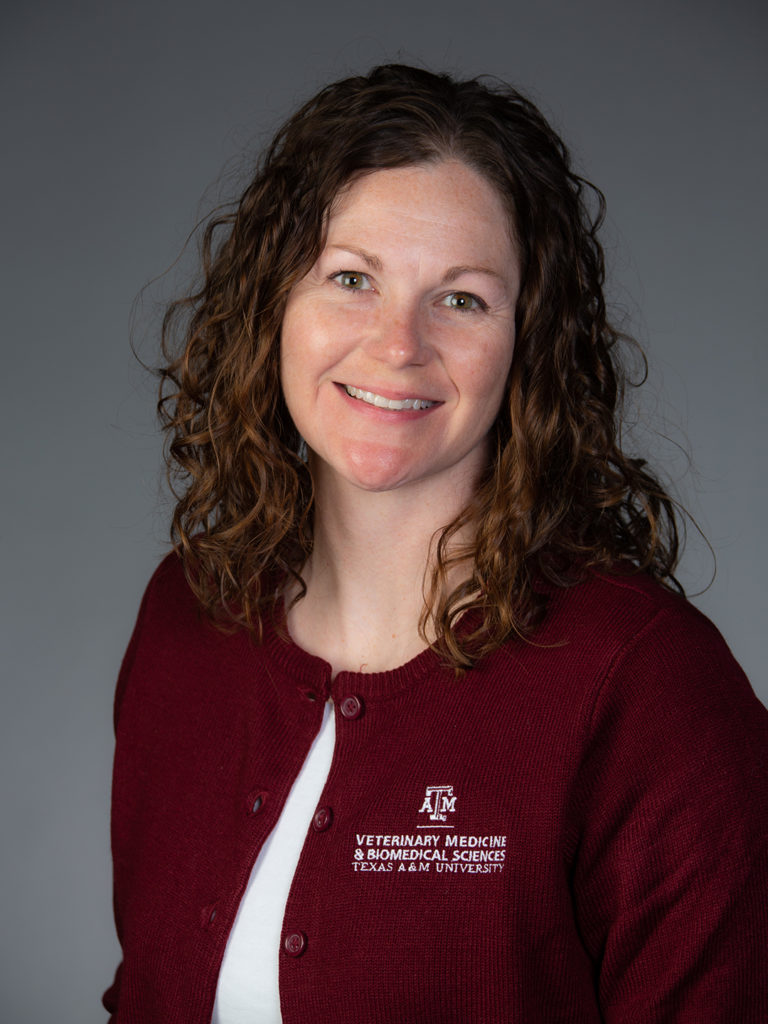VERO Faculty Member Earns Prestigious Veterinary Preventive Medicine Diplomate Certification
Story by Dorian Martin

Dr. Becky Eschmann, a faculty member with the Veterinary Education, Research, & Outreach (VERO) partnership between Texas A&M University’s School of Veterinary Medicine & Biomedical Sciences (VMBS) and West Texas A&M University’s Paul Engler College of Agriculture & Natural Sciences, recently earned the prestigious American College of Veterinary Preventive Medicine (ACVPM) Diplomate certification.
Only 10% of veterinarians currently hold board certification in at least one specialty. Dr. Sarah Capik, former VERO faculty member who recently joined Texas Animal Health Commission (TAHC) as a field epidemiologist, and Dr. Jessie Monday, veterinary diagnostician with the Texas A&M Veterinary Medical Diagnostic Laboratory (TVMDL), joined Eschmann in both preparation for the examination and successful completion of board certification.
“The addition of specialty training in prevention and control of animal diseases benefits the research, educational, and outreach missions of VERO,” said Dr. Susan Eades, associate dean for administration at VERO’s Canyon campus. “These are extremely important principles in veterinary medicine, especially in a region of our state where animal agriculture and food production are abundant. This advanced certification of Dr. Eschmann, Dr. Capik, and Dr. Monday will benefit the missions of VERO, TAHC, TVMDL, and animal health across Texas.”
Expanding Possibilities
Eschmann, a clinical assistant professor of small animal veterinary medicine, joined the VMBS in October 2021. She utilizes her previous experience in large animal medicine and her expertise in small animal medicine to fulfill the mission of VERO to train highly qualified, highly motivated students in the skills needed to serve the Texas Panhandle region; she educates and empowers students to gain a passion for preventive medicine and One Health.
Eschmann pursued ACVPM certification to further support her work within the global veterinary community dedicated to One Health—the integrated approach to animal, human, and environmental health across multiple medical, veterinary, academic, and public health disciplines.
“Experience and expertise in multiple veterinary preventive medicine fields are required for one to become a diplomate of the ACVPM. As a diplomate, I am joining a group of over 900 national and international veterinarians who are committed to the improvement of animal, human, and environmental health, sustainability, and well-being,” Eschmann said. “Achieving diplomate status not only means I can provide veterinary students a more expansive educational experience, but it also provides opportunity for collaboration with other professionals passionate about One Health.”
She said she appreciates the support she received from VMBS administrators and colleagues as she prepared for the intensive diplomate credentialing and examination.
“Earning diplomate status has enabled me to gain a broader knowledge base on a wide range of national and global issues within preventive medicine; it has pushed me to gain a deeper knowledge of these areas beyond what I previously learned in my educational experiences,” she said. “Having this deeper knowledge has provided me the ability to enhance the student educational experience, and to help them understand how animal, human, and environmental health are intricately linked.”
“Achieving diplomate status not only means I can provide veterinary students a more expansive educational experience, but it also provides opportunity for collaboration with other professionals passionate about One Health.”
Dr. Becky Eschmann
Specialized Knowledge
The American Veterinary Medicine Association (AVMA) recognizes 22 veterinary specialty organizations comprising 41 distinct specialties, including veterinary preventive medicine. Veterinarians can take examinations to receive recognition as specialists in these identified areas.
Presently, 10 of VERO’s 17 faculty members have earned board certification in at least one area.
“Specialty training gained through the certification process provides these faculty with additional knowledge and skills that then help them prepare students for the wide array of issues that they will face as professionals,” Eades said. “Specifically, Diplomates of the ACVPM have specialized skills in diagnostic medicine, epidemiology, herd health management, population medicine, public health, and regulatory medicine that are increasingly important to veterinarians today.”
As an integral component of veterinary medicine, the specialty of veterinary preventive medicine focuses on improving animal, human being, and environmental health through six categories:
- Surveillance, prevention, management, and control of disease.
- Investigation of outbreaks and implementation of corrective actions.
- Preparation, response, and recovery from natural and human-made disasters.
- Reduction of occupational and environmental hazards.
- Advancement of food safety, security, wholesomeness, and defense.
- Creation and implementation of policies and regulations.
To complete the pre-exam credentialing process, candidates must complete their Doctor of Veterinary Medicine (DVM) degree and have an additional four years of qualifying experience in at least three of the six veterinary preventive medicine categories. Additionally, they must be sponsored by a veterinarian who currently holds diplomate status and have two references that attest to the candidates’ competence within preventive medicine.
To earn diplomate status, candidates must pass a two-day board examination that assesses the candidates’ knowledge of the six veterinary preventive medicine categories, including assessment of communication skills.
###
For more information about the Texas A&M School of Veterinary Medicine & Biomedical Sciences, please visit our website at vetmed.tamu.edu or join us on Facebook, Instagram, and Twitter.
Contact Information: Jennifer Gauntt, Director of VMBS Communications, Texas A&M School of Veterinary Medicine & Biomedical Sciences, jgauntt@cvm.tamu.edu, 979-862-4216


